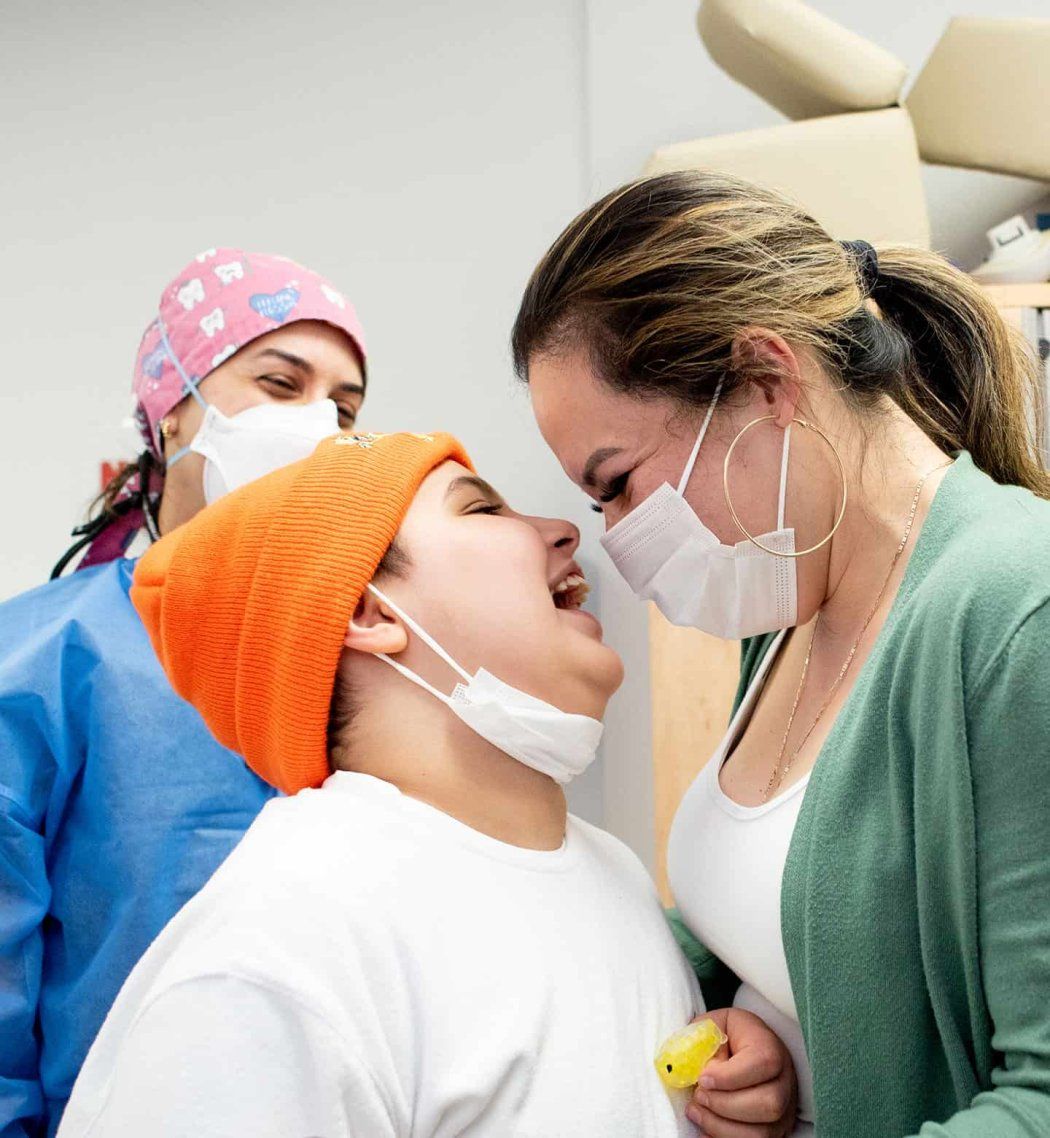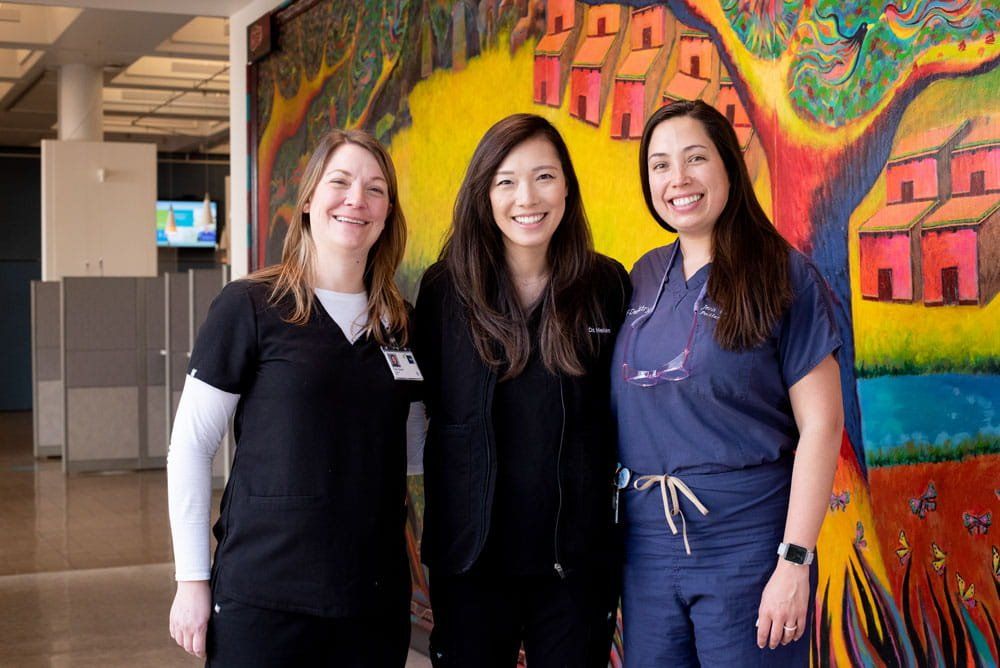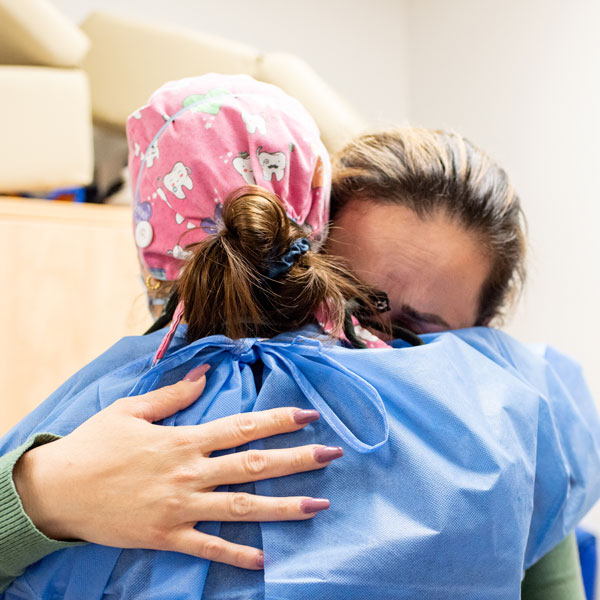
Behavioral Support Helps Patients Acclimate to Care One Step at a Time
UCSF School of Dentistry resident Kimiya Abtahi, DDS, counts aloud while gently brushing her 11-year-old patient’s teeth. The boy, Alex, sits perfectly still while his mother, father and younger brother look on. When Abtahi reaches the count of “10,” the whole family joins her in cheers.
A year ago, Alex, who has autism, refused to sit in the dental chair, much less complete a visit. Now Abtahi easily moves through various parts of the visit: peering in Alex’s mouth with a mirror, using a suctioning tube, brushing more teeth. Each step is counted and ends with applause. When the visit ends, the dentist and Alex’s mom hug.
“Last year, Alex was traumatized by a dentist near us who tore his lip while trying to keep him in the chair,” said Yanin Solis, his mother. “At UCSF, everyone is patient and gentle. I’ve started bringing my four-year-old – he has autism too – because I want him to learn early that it can be ok.”

Dental visits are challenging for many children with autism, a neurodevelopmental condition that often includes heightened sensitivity to physical sensations. The feel of being tipped back in a chair, the sound of whirring tools and the scent of fluoride polish can be overwhelming. Many young patients with autism are restrained or sedated to get through visits; in some cases, they are put under general anesthesia.
At UCSF Pediatric Dentistry’s Autism Program, patients like Alex are slowly exposed over time to each step of a dental visit to increase their tolerance. For some, the first visit is a virtual tour of the clinic from the safety of home; for others, it’s sitting in the dental chair for five seconds. Alex comes every six weeks and follows a plan created by a behavior analyst who specializes in autism.
“You can sedate and restrain a child for dental care, but then they don’t learn the life skill of going to the dentist, and that persists into their adulthood,” said Jean Calvo, DDS, an assistant professor of Orofacial Sciences who leads the program. “We are trying to equip children for a lifetime of good hygiene and care.”
Some Patients Drive Hours to See Us
Only a handful of dental clinics in the U.S. are dedicated to children with autism, and very few employ a behavior analyst, said Calvo. At UCSF, care is mostly provided by second-year pediatric dentistry residents who are required to do a rotation with the autism program.
“We’re training a new generation of dentists so more patients will have access to these strategies in the future, beyond the walls of UCSF,” Calvo said. “Right now, we have patients who drive hours to see us; there is a clear need for this type of care.”
Patients are seen on the first and third Monday of the month in the afternoon. Before the doors open, the residents have a quick meeting with Calvo and Tara Glavin, BCBA, a behavior analyst and consultant who creates individual plans for each patient to get accustomed to different parts of the visit. Together, the team discusses the children coming in that day – their goals, their challenges, what motivates them, tips for engagement.
“He’s chatty and likes to talk about baseball,” Calvo said of a patient at a recent meeting. Glavin added, “Just be sure not to talk about the visit after this one or he’ll get upset. Keep it focused on the present.”
During appointments, Glavin often lingers outside the exam room, listening to see if she might be needed. She may walk with an anxious patient around the hallways to calm down, or coach another through breathing exercises. The important thing, she said, is to meet the patient where they are: to challenge but not push, and to meet success with a lot of praise, excitement – and rewards.
“We’ve got stickers, slime, even sugar-free candy,” Glavin said, gesturing to a plastic container of goodies. “And to help kids get through the appointment, we have weighted blankets, earmuffs, fidget toys. We keep their favorite toothpaste in stock, in a baggie with their name on it. As much as possible, we create a familiar and welcoming environment where each child is understood and known.”
Meet the Founder
The program is the brainchild of UCSF Dental School alumna Helen Mo, DDS, MS, who is now in private practice but still volunteers with the UCSF pediatric autism dental program. Mo saw the struggles her patients with autism endured during her residency – and also witnessed them thanks to a relative with special needs. There has to be a better way, she recalled thinking.

Tara Glavin, BCBS (left), is a behavioral therapist at the UCSF Pediatric Dentistry’s Autism Program. Jean Calvo, DDS (right), leads the program today, which was founded by Helen Mo, DDS, MS (center), in 2017. Photo by Barbara Ries.
“I reached out to the head of UCFS’s autism clinic in 2017, and we started out with my doing oral health screenings there,” Mo said. “But I couldn’t do proper dentistry that way, so we made a plan for being able to see those patients at the UCSF pediatric dental clinic, where we had all the equipment.”
Eventually, Mo, Calvo and Glavin secured a grant to employ Glavin, who was working at UCSF’s autism clinic in the Department of Psychiatry at the time. Together, they created a system where Glavin would evaluate patients’ challenges and needs, as well as what motivated them, then work with the dentists on a slow, stepwise approach to introducing care over a period of time.
It’s an example of how dentistry and the medical community are rethinking integration of two fields that have historically been separate. UCSF dental clinics are among the first in the country to start integrating their dental clinics with medical care, including mental and behavioral health.
“The cross-collaboration between dental and behavioral health is really what makes this program stand out,” said Mo.
We Need More Dentists Like These
Nowadays, three residents do the main dental work in the clinic at any given time, supervised by Calvo and supported by Glavin and Mo.
While the COVID-19 pandemic halted in-person visits for several months, the clinic is running full-tilt at present with 90 active patients. In the two years since it opened, there have been 531 patient visits, and two dozen residents have rotated through the program.
It has gone so well, in fact, that Calvo was inspired to start another project so pediatric dental students can be trained in their third and fourth year of school to treat patients with special health care needs.
“It’s broader than the autism program – the patient’s needs may be behavioral, or it could be that a patient has cerebral palsy or cancer,” Calvo said. “We’re starting with five dental students, ramping up to 10 next year, and hopefully we can keep increasing the number of students over time.”
For Yanin Solis, who tells all her friends with special needs children to go to UCSF, these specially trained dentists can’t get out into the world fast enough.
“We need more parents to know there are places like this that you can take your kid – places that are safe,” Solis said. “And we need there to be a lot more options like this, too.”

“We need more parents to know there are places like this that you can take your kid – places that are safe.”
YANIN SOLIS, MOTHER OF PATIENTS ALEX AND CHRISTOPHER SOLIS